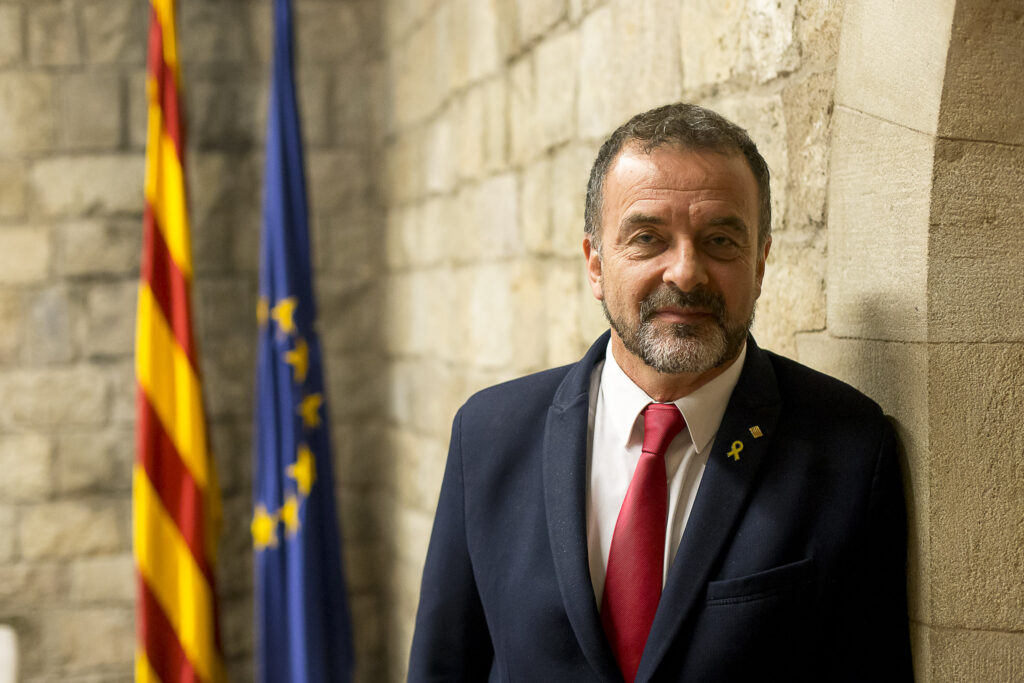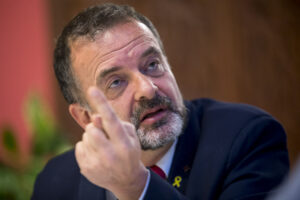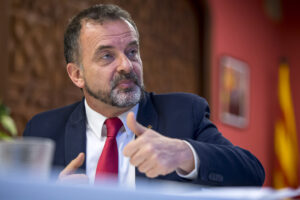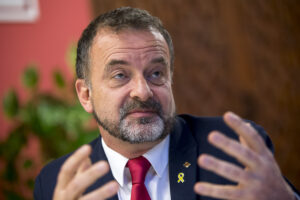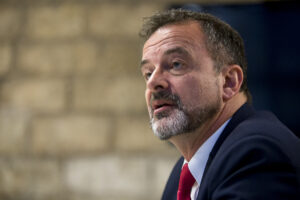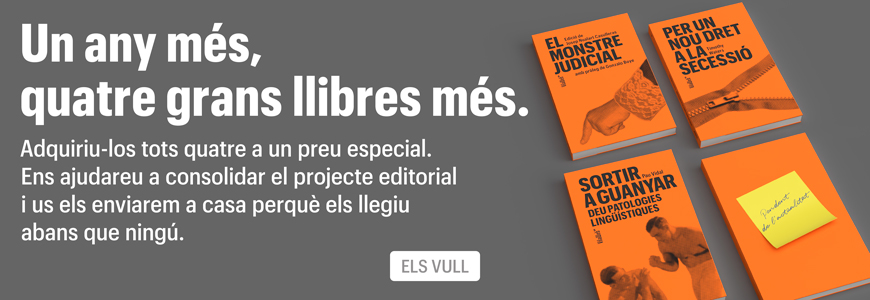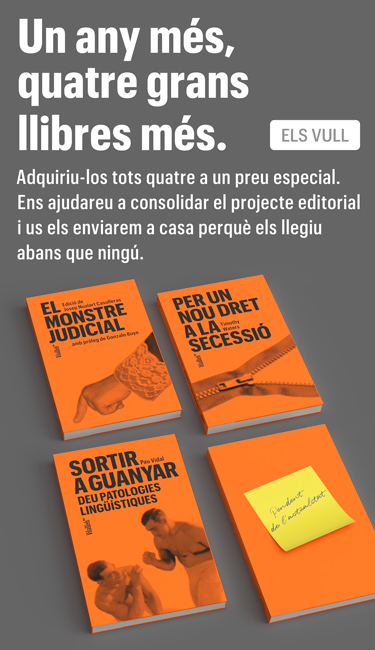15.04.2019 - 07:19
|
Actualització: 15.04.2019 - 09:19
Alfred Bosch (1961) is the Catalan government’s Foreign Minister. An
essayist and writer, Bosch holds a History degree from the University of
Barcelona and has been both an MP in Madrid and a city councillor in
Barcelona for Esquerra Republicana de Catalunya. Now, at a delicate time
when his ministry is a primary target of the Spanish authorities’ crackdown,
Bosch is taking Catalonia’s diplomacy to the rest of the world. VilaWeb
conducted the interview at the Ministry’s offices, its walls covered with
photographs of Raül Romeva [one of the jailed leaders and himself a former
Foreign Minister]. Bosch has just returned from a European tour of Madrid,
Brussels, Paris, London, Rome, Geneva, Berlin and Reykjavik.
—You ministry has endured major hits by Court Number 13. Many of your
staff have been indicted or are being probed.
—I think it’s all about a general onslaught on us, using the law, to make us stay
at home. To stop us from getting out. Which is something we’d never do, since
we have every right to do so. And it’s our obligation to represent our country on
the international arena. Nobody will stop us from doing our job.
—You’ve been to seven capitals in seven weeks. What do people tell you
on your trips?
—We can see that there’s a growing concern for human rights in Catalonia and
the Kingdom of Spain. Due to all the goings on involving the various trials. Due
to the nine people who are in prison without bail. Due to the charges they’re
facing. Due to the fact that a far-right party is part of the prosecution. These
things are hard to grasp for modern, democratic, western societies. They simply
don’t understand what’s going on. And, therefore, there’s a feeling abroad that
the powers of the state have got it wrong. This is what people realise, and it’s
gaining momentum. Look at the public statement endorsed by the 41 French
senators, of virtually every party, apart from the pro-Le Pen far-right. Look at the
statement signed by over seven hundred Italian intellectuals. And they are all
saying the same thing: the human rights situation and the lack of dialogue in
Spain is not compatible with Europe’s core values.
—Do you face any criticisms? You must do.
— More than criticisms, they tend to stick together due to the fear that such a
thing [secession] could also happen in their country. That’s what you find in the
EU and within many European governments. The states still feel like they owe
each other a certain amount of loyalty.
—Are you received by government representatives?
—I need to be discreet on this point. What I can say is that everywhere we
went, we were made very welcome. They listened to us, and they took an
interest in everything we had to say. We had meetings with think tanks,
organisations, the media and with political parties on all sides, whether they’re
in government or in the opposition. Except for the far-right. Obviously, people
are surprised and astonished by everything that’s going on in Spain.
—It must’ve been easier having Rajoy as a rival than Sánchez.
—Why?
—Don’t you think that Sánchez has a better public image than Rajoy? It
must be harder to speak of injustices committed by a president who has
surrounded himself in government with women and astronauts. He’s a
modern type! Isn’t it difficult to overcome this image?
—And surrounded by people like Josep Borrell and Irene Lozano, who likens
voting to rape? Pedro Sánchez makes our job more difficult? In terms of foreign
affairs, we’ve got plenty of ammunition and we see plenty of signs of despair
and lack of arguments on the other camp. I’m not saying the job’s easy, and in a
repressive climate, even less so. But having clear ideas and basing our
arguments on universal values (human rights, democracy, dialogue) has made
it easy for us.
—I have no doubt that we’ve won the battle with the media and public
opinion, which is always in favour of human rights. The question is
whether we’ve won it with the governments. As far as universal rights are
concerned, it goes in one ear and out the other.
—Take the survey by the Elcano Institute, for example [a Spanish think tank].
Four years apart. The level of support for Catalonia’s right to self-determination
has grown enormously. The level of understanding has grown enormously. The
level of acceptance that an independent Catalonia could work, has skyrocketed.
The level of acceptance in terms of public opinion and in the media prove that…
— … that we’re doing well with the media, but not with the governments.
—But governments can’t ignore public opinion. In a society such as the UK or
Sweden, governments can’t ignore what people think.
—In the United States, 80% of people oppose the healthcare system. It’s
been that way for years. But nothing changes. Governments do pretty
much what they want. Don’t you agree?
—I think that if governments want to survive, they have to listen to public
opinion. As a result, in the end we obviously have to talk to governments. And
they need to pay attention to our demands. But for now we are making a lot of
progress with the media, with public opinion and MPs. French senators, the
Council of Europe, Italians. When the immediate political environment changes,
they feel the pressure. In this point, things are going well. Would we like things
to be moving much faster? Sure. But things are going well.
—On 27 October you said: “A new country has been born”. Do you still
believe that to be true?
—Let’s see, a country became emancipated because it decided to vote and
make a decision. We’re clear on the decision. We’ll make it again, as often as
we see fit. But it’s clear that we were a country before 1 October; and now we’re
a new country. It’s clear that it’s changed us. It’s made us more mature. Freer.
Renewed.
—Has anyone criticised you for not following through on your promise to
make the Republic a reality in October 2017? You said we’d become a
Republic, and it didn’t happen. Have you received any backlash for this?
—We get the idea that we have to be stronger at home. So that the result
appears much clearer abroad. The vote ought to look much broader.
—Dialogue and peace are all well and good. But do we need to be tougher
on our foreign affairs? On 10 October 2017 they asked Puigdemont to pull
the reins in on independence as that would get Rajoy to sit down for talks
[which didn’t materialise]. In fact, only going all the way would have got
Rajoy’s attention. This killer instinct, do we have it at the international
level?
—I think everyone who wants a Catalan Republic will agree that we won’t have
another 17 October. Because we want to win. We want a republic and we don’t
want to go to all that effort to get people involved in the decision and then not go
through with it as we’re not strong enough. Now we have to look for that
strength that maybe we didn’t have at the time. Let’s create a different scenario.
A scenario which we can really turn to our advantage. But getting our way
means people can really decide and that the decision can be put into effect.
—Do you rule out the unilateral path, which is what we’ve followed up to
now?
—It depends what you mean by it. Our priority is to hold a referendum based on
the Scottish model. To reach an agreement, maybe not with the state, but with
the international community. It’s fundamental, since they’re the ones who will
have to give us their blessing.
—Spanish history doesn’t look very promising in this respect. They’ve
only ever held one referendum [on independence]. Franco in Equatorial
Guinea. Going down this path looks like its doomed to failure.
—That’s right, during the Franco era they were able to hold a negotiated
referendum in Equatorial Guinea. Let’s see if those who now point to the
Kingdom of Spain’s high democratic standing are able to hold one. It ought to
be perfectly possible.
—PP, PSOE and Cs are less likely than ever to agree to hold a referendum.
Doesn’t it strike you as a little naive to go down this path?
—It depends on the sort of government that is in power in Spain. But we must
work simultaneously on all fronts. So long as we are able to garner international
support, it will be easier to convince the Spanish government that this is the
best solution. Because putting people in jail isn’t the solution. There was a
meeting between the Spanish and Catalan governments on 20 December,
which resulted in a joint statement saying they’d work towards a democratic
solution. If Pedro Sánchez’s government were prepared to go so far as to issue
a joint statement…
—But Mr Bosch, Pedro Sánchez has publicly stated that they won’t hold a
referendum.
—Sure. But when the [Spanish election] campaign is over, we have to be able
to sit down and talk. Every state in the world has told me we ought to have a
popular mandate which will be accepted by the whole world. Let’s see what
Spain does. But we have to get support from around the world. If we don’t, we’ll
be back to where we were in 2017. We have to enter a different phase. A phase
in which international backing is possible. That’s what I’m working on.
—Would the world want you to win an election with more than 50% of the
vote in the Catalan parliament? Would that be sufficient support as far as
they’re concerned?
—Obviously, more than 50% would help. 60% would help even more. And as
for 70%, you can imagine. Therefore, we must try to get the highest level of
support possible. So that I can go, or whoever is in a position to do so, and visit
the seven capitals and say: “Look, this is the official, indisputable result. And it
proves that people want this change”. All that would give us the strength that we
lacked on 1 October.
—Would the world allow us to declare independence with 60%, 70% of the
vote in parliament?
—It would be a great help. And it’s possible that with such a result it would be
easier to put this democratic solution which we are calling for into action. We’d
be better understood and we’d receive more backing. We’d be stronger at the
international level. To obtain a Catalan republic we need the two things that any
independence process requires: inner strength and external pressure. I also
have the obligation to speak about the reality of what they tell me. And they tell
me to exercise democracy in a clear and strong enough way for it to be
recognized by the whole world.
—You’ve been told this by people who gained independence at the
expense of the loss of lives, or through a unilateral declaration of
independence. Which is ironic.
—Yes, it’s possible. Nevertheless, we don’t want to take either the path of
violence or the path of hostility. Because we Catalans are a people who like
peace, dialogue, democracy and human rights. It’s part of our DNA. And to
some extent it’s a value which helps us.
—Do you have any other trips planned?
—In the second phase we’ll target every continent. We’ll undertake more trips
and missions. We have to go to Asia and Latin America.
—You were in Madrid for many years. Did they help Sánchez become PM
without getting anything in return? It’s a tough call.
—It’s not easy, indeed. The only thing that we have to demand, and really insist
on, is that there’s dialogue without conditions. That they show courage.
Because right now it looks like Sánchez isn’t brave enough. He doesn’t have
what it takes to achieve the only solution possible. Negotiated and democratic.
The solution won’t come from echoing the far-right. By saying no to dialogue.
And not by raising an arm in a fascist salute, either. Or returning to extreme,
Taliban-like nationalism.
—Is the Council for the Republic a good idea?
—It’s a useful tool. And it’s part of the Catalan government’s agreement. The
Council’s job of drumming up international support fits in nicely with the work
that the government’s doing. And, specifically, the President of the Council for
the Republic, whom I went to see immediately. He’s probably the best-known
Catalan politician in Europe and in the rest of the world.
—Do you have a good relationship with Puigdemont?
—Yes. We’ve never had any issues. And, besides, him having chosen to stand
as an MEP, and therefore wishing to appear in the heart of Europe to defend the
Catalan cause, to denounce the repressive judicial and political practices, will
also help us. There’s so much work to do, there’s no danger of it running out.
There’s no harm in sharing the workload.
